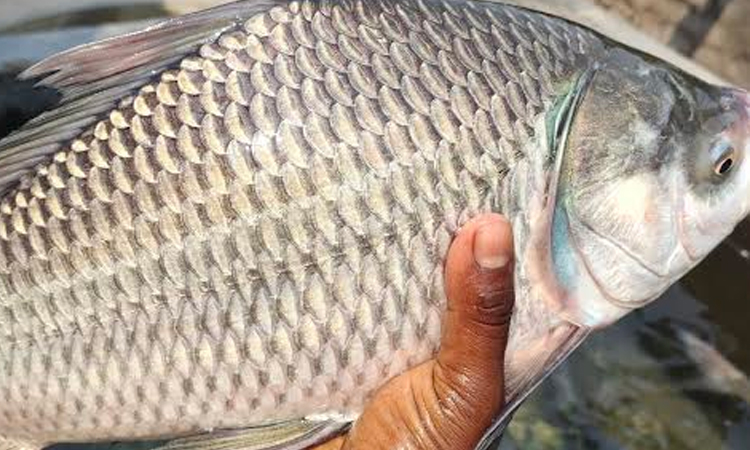News Flash
News Flash

By Md Aynal Haque
RAJSHAHI, April 27, 2025 (BSS) - Fish farmers in Rajshahi, particularly across the Barind tract, are experiencing higher profits and better resilience to climate change due to innovative and eco-friendly fish farming technologies.
Adoption of climate-resilient methods has transformed fish farming in areas like Paba Upazila, leading to significant increases in production.
Supporting this growth, a modern fish market-Kharkhari Hygienic Fish Market-has been set up in the Kharkhari area. Established by the NGO Ashrai under the Sustainable Enterprise Project (SEP), with support from Palli Karma-Sahayak Foundation (PKSF) and the World Bank, the market can handle 50-60 tons of fish daily.
This environment-friendly market features digital weighing machines, access to ice, personal protective equipment (PPE), and facilities for live fish transport. It also connects farmers with loans, technical support, and training in climate-resilient techniques.
"We aim to ensure safe, live fish reach consumers while supporting fish farmers with modern tools," said Wali Ullah Mollah, Senior Upazila Fisheries Officer, Paba.
The SEP initiative has trained farmers in technologies like cage culture, biofloc, pen culture, bottom-clean aquaculture, and ecosystem-based feeding. These methods boost productivity and reduce environmental impact.
SEP has also ensured 30 percent participation from women, significantly improving household incomes.
A notable success story involves 25 ethnic women in Chapainawabganj's Amnura area who leased a pond and applied natural ecosystem-based feeding techniques to achieve sustainable income. Similarly, 11 unemployed individuals launched a self-managed kole fish culture project in the Mohanonda River.
Farmers and traders now benefit from post-harvest amenities, including digital meters, ice access, PPE, and digital water testing kits.
Ashrai's Deputy Director Jasim Uddin said these tools motivate the community to maintain hygiene and quality in fish transportation.
Rajshahi dispatches 140-150 trucks of live fish-worth about Tk2 crore-daily to various districts, including Dhaka, according to District Fisheries Officer Jahangir Alam.
Currently, the district hosts 13,050 hectares of fish ponds, producing around 84,000 tons of fish annually. Many locals have become self-reliant through fish farming, a practice deeply rooted in the region's history.
BSS talked to a number of fish farmers in the region.
Fish farmer Sadiqul Islam from Paba Upazila started fish farming in 2007. Today, he manages ponds on over 180 bighas of land.
"Fish farming is highly profitable. Live fish trading offers even better returns," he said.
Ershad Ali of Shilmaria village in Puthiya Upazila noted that more landowners now dig ponds for leasing to fish farmers.
"The current lease rate is around Tk 20,000-30,000 per bigha. With Tk1.5-2 lakh, one can easily start fish farming using modern methods," he added.
Amzad Hossain of Keshorehat village in Mohanpur Upazila produced over 30 tons of fish worth Tk44.25 lakh in 2019, netting a Tk 15 lakh profit.
He sources eggs from government hatcheries and rivers, breeds them himself, and credits initial training from the Upazila Fisheries Office for his success.
Hundreds of new commercial ponds are being dug across the region, reflecting the booming potential of this climate-smart aquaculture movement.